

24.120 Moral Psychology, Spring 2009. Questionnaire. What is your philosophy?
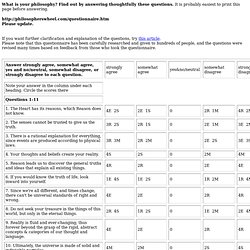
Find out by answering thoughtfully these questions. It is probably easiest to print this page before answering. Please update. If you want further clarification and explanation of the questions, try this article. Please note that this questionnaire has been carefully researched and given to hundreds of people, and the questions were revised many times based on feedback from those who took the questionnaire. Then add all the E scores across the columns above _______ Then all the S scores ________ Then all the R scores ________ Then all the M scores ________ Write the larger letter scores above the smaller letter scores here: Write the letter corresponding to the larger score next to the result.
For example: The meaning of the scores: what is your philosophy? The approach to thinking shown by your score matches these Jungian functions and MBTI temperaments, although your temperament itself may be different: Plot your score here on the map of the mind below. Black Iron Prison - Page 19. Something and Nothing, Truth and Lies Before the beginning, there was a 50% chance that nothing would exist and a 50% chance that something would exist.
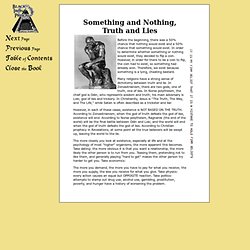
In order to determine whether something or nothing would exist, they decided to flip a coin. However, in order for there to be a coin to flip, the coin had to exist, so something had already won. Do I See What You See? Colin Allen MINDREADING ANIMALS: The Debate over What Animals Know about Other Minds.

Robert W. Lurz. xviii + 245 pp. The MIT Press, 2011. $35. Does your dog know what you are thinking? Robert Lurz, a philosopher at Brooklyn College, CUNY, surveys the experiments at the heart of the debate and finds that not one of them solves what he calls “the logical problem” in animal mind-reading research. Lurz argues that all previous experiments conducted or proposed to test mind reading in animals suffer from some version of this problem. PHIL 2340 Home Page (Curtis Brown) Philosophy 2340 Symbolic Logic Spring, 2014 Course Materials Course materials are on the TLEARN site, which should be your primary source of information about the course.
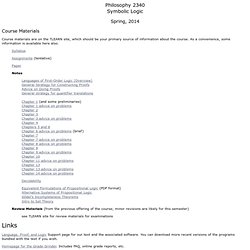
As a convenience, some information is available here also. Freud's *The Interpretation of Dreams* Chapter 1, Section D. Back to Psych Web Home Page Back to The Interpretation of Dreams Table of Contents D. Why Dreams Are Forgotten After Waking That a dream fades away in the morning is proverbial. Western Philosophy. 12 Great Books That Everybody Should Read At Least Once.
Great books shift how you look at life and how you feel from when you pick them up to years after reading.

The best books to read leave you tired but inspired – thirsty for more. The first library I stepped into when I was a mere 6 years old had a large slogan above the door: “Read to Succeed” There are so many amazing books out there with so much great knowledge and wisdom, that you’re cutting yourself short if you do not read at least one new book every month. Finding great books can be a bit of effort, so here is my list of books that everyone should read- Really the best books I have read in my life. Many are related to self improvement and personal development books, but since you are reading this article on Upgrade Reality (a blog about self improvement), these topics should be very welcome for you. Part of Nietzsche’s problem with history, science, and the knowledge drive in general is that these activities typically presuppose that "knowing" is possible, and that truth is more valuable than untruth, or appearance.
Part of Nietzsche’s problem with history, science, and the knowledge drive in general is that these activities typically presuppose that "knowing" is possible, and that truth is more valuable than untruth, or appearance.
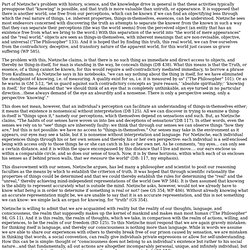
It is supposed that there is another world, one free from our perceptions, which can be known if we can find an objectifying lens through which the real nature of things, i.e. inherent properties, things-in-themselves, essences, can be understood. Table of contents. (With last update date) Cover Foreword (August 13, 2009) Part 1.
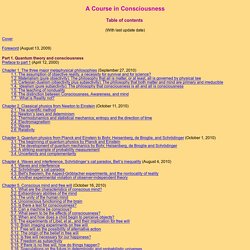
Quantum theory and consciousness Preface to part 1 (April 12, 2000) Chapter 1. PhilPapers: Online Research in Philosophy. Philosophical Journals - Electronic. EpistemeLinks: For Philosophy Resources on the Internet. Philosophy Bro.
Philosophy Forums. A course in consciousness. Time Perception. Time Perception [Publishers are always concerned about the number of pages in a book, so to pare down an earlier edition of the text, this section was removed.
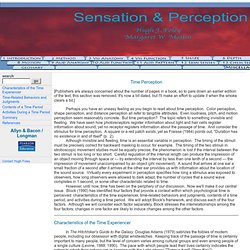
It's now a bit dated, but I'll make an effort to update it when the smoke clears a bit.] Perhaps you have an uneasy feeling as you begin to read about time perception. Color perception, shape perception, and distance perception all refer to tangible attributes. Even loudness, pitch, and motion perception seem reasonably concrete. Philosophy TV. Philosophy bites. How Language Works (Edition 3.0): Table of Contents - StumbleUpon. Squashed Philosophers- Condensed Plato Aristotle Augustine Descartes Hume Marx Freud Copernicus Hobbes Sartre Ayer Sade Wittgenstein Einstein.